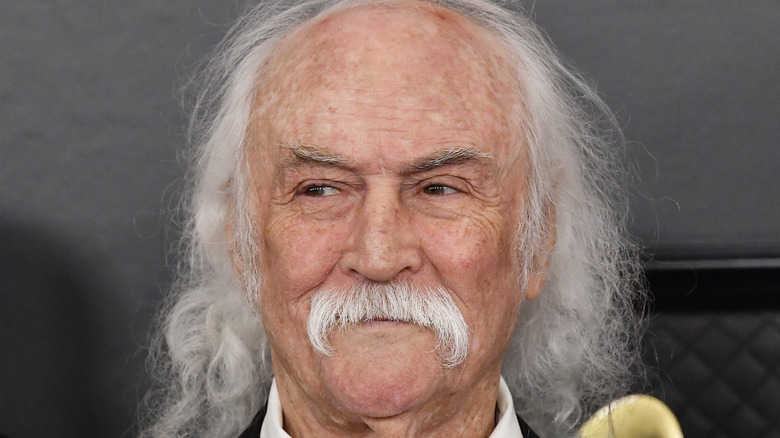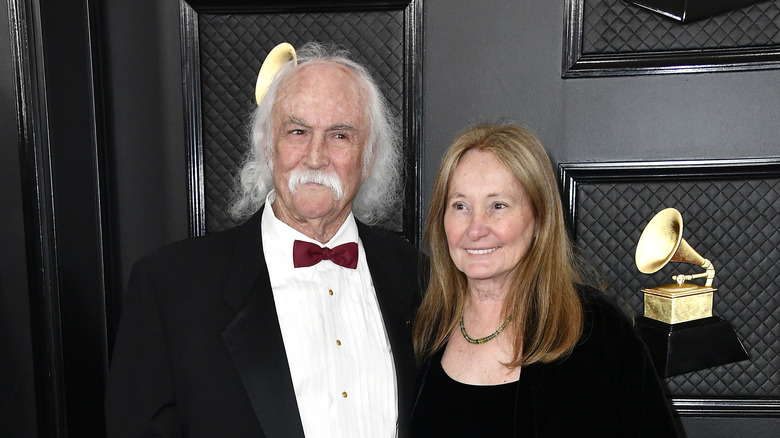What To Know About David Crosby's Health Issues Over The Years
The music world lost a legend today with the announcement that David Crosby, 81, has passed away. His family and representatives have not yet released a cause of death, but no cause is likely to ease the surprise felt by his fans. As Variety reports, Crosby tweeted actively. His most recent tweet, posted Wednesday, was a joke about the view from Heaven.
It was a small taste of the outspoken and opinionated behavior Crosby was known for. Variety described him as the embodiment of the '60s rock and roll lifestyle, with all of the drugs and alcohol that entails. It was a lavish lifestyle but it left many rockers with long-term health problems.
In Crosby's case, the most public of these was a liver transplant in 1994. Despite the intensity of such a procedure, Crosby didn't slow down, He continued with active tours well after 2000. And, as recently as last year, Crosby talked about producing new music and continuing to do so for as long as he could "as long as it's good."
Crosby's intense dedication to his art is not something to be overlooked, especially given his health issues. He might have made it look like a blip on his radar, but liver transplants are no small feat.
The risks of a liver transplant
Mayo Clinic explains there are two types of liver transplants. A failing or failed liver is removed and replaced with either a whole healthy liver from a "deceased donor" or only a part of a living donor's liver.
Without a healthy liver, the body cannot process fat or cholesterol, maintain a regular immune response, or produce proteins necessary to clot blood. And there are, unfortunately, several ways to damage a healthy liver.
In Crosby's case, the public was aware of his drug and alcohol use. Both of these factors can lead to cirrhosis, which is the type of damage that causes liver failure. But there are other factors that would not have been so obvious and may still have contributed. Several genetic conditions and a number of non-genetic diseases can all contribute to cirrhosis, according to Mayo Clinic.
The procedure is not without risks of its own, either. The donated liver could fail or be rejected, the patient's bile ducts could be affected, and it is possible for the patient to both form too many blood clots or not enough.
Crosby beat the odds, however. Not only did his body accept his donated liver, but he thrived for nearly another 30 years after his procedure.
Crosby's history of heart problems
At the age of 72, the musician nearly suffered a heart attack after a routine cardiac stress test detected an almost completely blocked artery within his heart, reports SFIST. Forced to reschedule his live performances set that week in California, Crosby received emergency heart surgery after his doctor stressed that Crosby was in prompt need of cardiac catheterization.
As per the Mayo Clinic, those who undergo cardiac catheterization surgery have a catheter inserted into the heart by maneuvering the tube through a blood vessel. The procedure allows doctors to identify blockages, measure oxygen levels within the heart, extract tissue samples, assess how effectively the heart is pumping blood, diagnose various heart conditions, and more. With proper medical care, Crosby was able to make a full recovery after his procedure. Following a liver transplant in the early 90s, the rock legend voiced how lucky he felt to have come through his heart surgery safely.
The musician was diagnosed with diabetes
In 2019, Crosby participated in the Rolling Stone's Ask Croz series where he responded to fan questions about both his professional and personal life. One fan shared that they had recently been diagnosed with diabetes, to which Crosby responded saying that he too had been living with the condition for the past four decades. "With Diabetes, your goal is to have a hemoglobin a1C of under 7," the artist explained. In addition to maintaining a healthy diet, Crosby also cited portion control as his main means of managing the condition. "What I did was cut my portions in half," he said. "I cut it in half and I only eat that. I went from 240 [lbs] to 180 and I've stayed there for three years. You shouldn't be eating more than what you can fit in your hand," he stated.
As per the National Institute of Diabetes and Digestive and Kidney Diseases (NIDDK), weight management is one key factor in living with diabetes. In addition to taking any prescribed medications, avoiding smoking, and sticking to a meal plan agreed upon with your physician, experts suggest incorporating a half-hour of exercise on as many days as possible throughout the week.
Ultimately, Crosby leaves behind a legacy of rock, the sound of not only a decade but a generation, and a circle of both friends and family mourning his passing — along with fans the world over.




